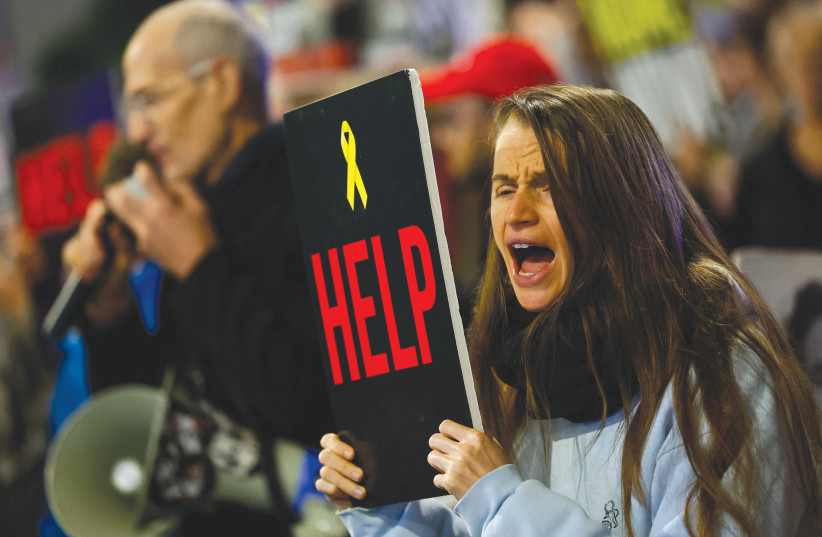In an online conversation on Sunday, an aide to US President Joe Biden asked me how I would describe my feelings on the date marking six months since the Hamas attack of October 7. The truth is that words fall short of how many of us feel. I didn’t want to reduce the sentiments to some catchy headline-sounding phrase, but ultimately that’s what I did; that’s what came to my head.
“Down, drained, and disgusted,” I replied.
The Biden aide felt that the feelings of “down” and “drained” required no explanation, but wanted me to go into detail over the feeling of “disgust.”
I told him that the disgust was with the world for urging Israel to beg for the hostages back, to negotiate with Hamas as though there was moral equivalence, as though the hostages held in Gaza – civilians snatched from their homes and a music festival and the soldiers who had come to try to save them and defend all of us in Israel – were the same as prisoners who are in Israeli jails for involvement in terrorist activity, likely wishing that they too could have carried out an October 7-style attack.
“Forget about the obscene ratio of how many of them are expected to be released in exchange for the hostages,” I added.
“Why are you letting this happen?” I burst out at the presidential aide, who deals with Middle East policy.

“Is it too simplistic to ask that there be an international effort to force a Hamas surrender and immediate release of hostages, no questions asked?”
I didn’t want to make this a monologue, but clearly, the aide did not have an immediate reply.
Biden aid defends the US president
The dramatic tone eased, and he and I started to talk about the president’s quick response after the Hamas massacres, and how Biden is “truly a good friend and feels very close to the Israeli people,” as the aide put it.
Then the White House official made comments that seemed a mix of rationalizations for not having a better response to my outburst and a candid expression of the international reality.
“I do not want to speak for the international community,” said the aide, ”but while there was immense support for Israel in the aftermath of the Hamas atrocities, there wasn’t a feeling that the response should be an international military campaign to bomb the living daylights out of Gaza.
“There was great sympathy for the Palestinian citizens of Gaza who were not involved in this,” he continued. “Therefore, we were told by many of our partners, countries who are also friendly with Israel, that they understood that Israel had to act, but using our resources with countries like Qatar, we had to try to negotiate simultaneously to do whatever is necessary to limit the harm to Palestinian civilians.”
The aide insisted that despite the lack of an international military coalition, the Biden administration has “worked together with Israel on trying to ensure an effective military response that could lead to the defeat of Hamas.”
He also maintained that the president does not view the battle against Hamas as completed. “When Israeli defense leaders themselves speak of a ceasefire and a hostage deal with painful concessions for Israel, but then resuming with the military response once Palestinian civilians are removed from the Rafah area, they are not contradicting our position.”
He argued that “we never said that Israel should not operate in Rafah. In fact, we have been consistent. From day one, we have worked with Israel on carrying out pinpointed operations instead of massive bombings. We have been concerned all along that massive bombings also posed a greater danger to IDF soldiers and the hostages. I’m not saying that it’s simple, but that’s what we’ve tried to do.”
He also maintained that while much has been made public, there has also been a great deal of covert cooperation between the US and Israel in dealing with the military situation.
Gaza situation and elections
“If this wasn’t a presidential election year,” I asked, “how different would Mr. Biden’s response be to the Gaza situation?”
“His policy would be the same,” the aide replied firmly but then added: “I don’t deal with politics in my job as much as diplomacy, but heck, can you tell me that Mr. Netanyahu is popular in Israel? So if people in the Democratic Party are warning the president of defeat in our upcoming election because of his support for the Netanyahu government, and the president replies that the issue is not Netanyahu but the State of Israel, stressing that Israel is a crucial ally of the United States without which America would be worse off, what’s wrong with that?”
“So you also want an early Israeli election?” I asked.
“Don’t go there and stop complaining about Senator Schumer,” the aide retorts. “You know how dear Israel is to Chuck, and how supportive he has been. I can tell you that he has made the administration’s life easier when we work closely with Israel.”
At the close of our conversation, I asked the White House aide how he would describe his own feelings on the date marking six months since the Hamas attack on Israel.
“I feel tortured by the anguish of the Israeli people,” he said. “I feel frustrated over the loss of life of all innocent people: Israelis, Palestinians, and the aid workers, of course. We live in a far-from-just world, and I hope that good people on all sides can work together to rid [the region] of terror and bring peace.”
"What about the ‘day after’ in Gaza? The possibility of an all-out war between Israel and Lebanon?” I ask.
“Yes, there is a lot more to discuss," he replied, "and we and Israel are cooperating on that.”
The writer is op-ed editor of The Jerusalem Post.
